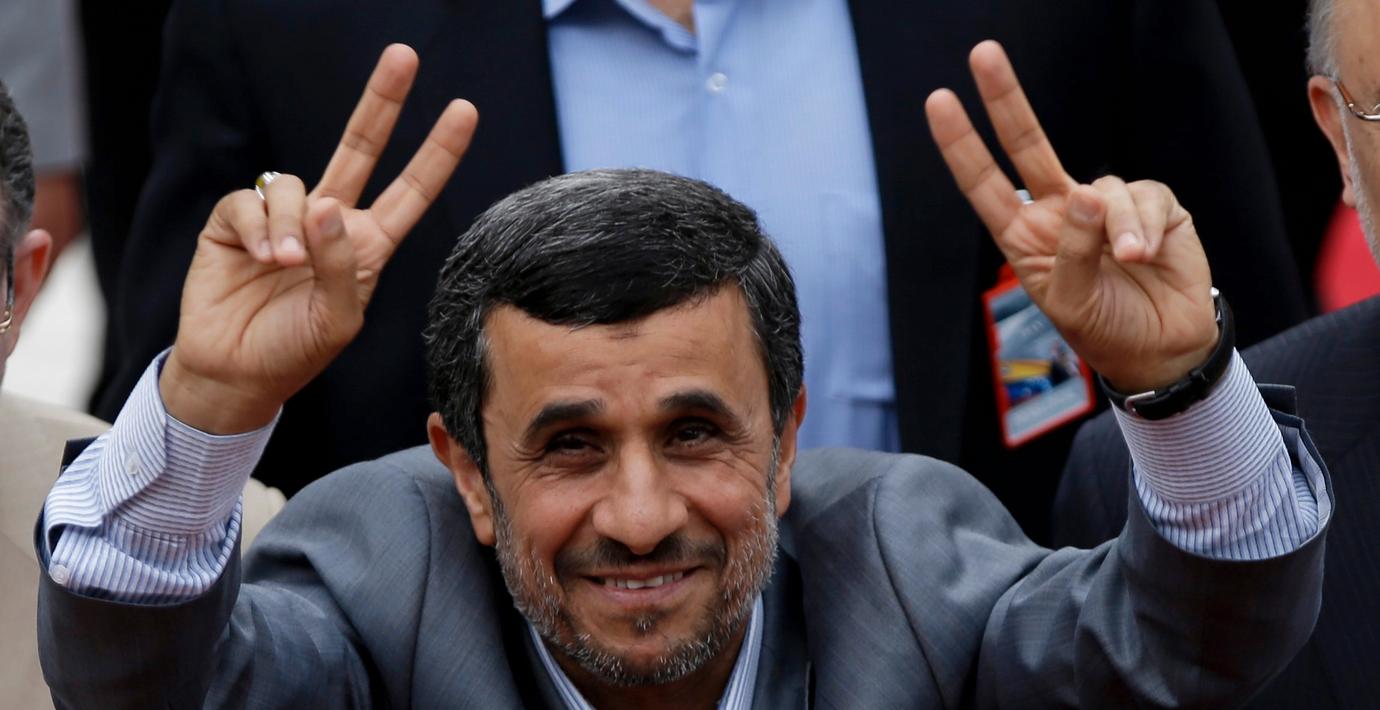
Ahmadinejad vill bli Irans president på nytt
Irans tidigare president Mahmoud Ahmadinejad har registrerat sig för att delta i landets presidentval i Maj, rapporterar AP. Beslutet går emot en rekommendation från Irans högste ledare, ayatolla Ali Khamenei.
Ahmadinejad har tidigare sagt att han inte tänkte delta i valet, men många hökar i Iran har velat se en tuff kandidat som kan stå upp emot USA:s president Donald Trump, skriver nyhetsbyrån.
En AP-reporter bevittnade på onsdagen hur förvånade valmedarbetare tog emot Ahmadinejads handlingar. Den sittande presidenten Hassan Rouhani väntas också ställa upp till nyval.
bakgrund
Mahmoud Ahmadinejad
Wikipedia (en)
Mahmoud Ahmadinejad (Persian: محمود احمدینژاد, translit. Mahmūd Ahmadinezhād [mæhmuːd(-e) æhmædiːneʒɒːd], born Mahmoud Sabbaghian (Persian: صباغیان, translit. Sabbāghyān) on 28 October 1956) is an Iranian politician who was the sixth President of Iran from 2005 to 2013. He was also the main political leader of the Alliance of Builders of Islamic Iran, a coalition of conservative political groups in the country.
An engineer and teacher from a poor background, Ahmadinejad joined the Office for Strengthening Unity after the Iranian Revolution. Appointed a provincial governor, he was removed after the election of President Mohammad Khatami and returned to teaching. Tehran's council elected him mayor in 2003. He took a religious hard line, reversing reforms of previous moderate mayors. His 2005 presidential campaign, supported by the Alliance of Builders of Islamic Iran, garnered 62% of the runoff election votes, and he became President on 3 August 2005.
During his presidency, Ahmadinejad was viewed as a controversial figure within Iran, as well as internationally. He has been criticized domestically for his economic policies and disregard for human rights. Internationally, he is criticized for his hostility towards some countries, most notably Saudi Arabia, Israel, the United Kingdom, and the United States and other Western and Arab nations. In 2007, Ahmadinejad introduced a gas rationing plan to reduce the country's fuel consumption, and cut the interest rates that private and public banking facilities could charge. He supports Iran's nuclear program. His election to a second term in 2009 was widely disputed and caused widespread protests domestically and drew significant international criticism.
During his second term, Ahmadinejad came under fire not only from reformers but also traditionalists in parliament and the Revolutionary Guard, and even from Supreme Leader Ali Khamenei, over accusations of corruption, Ahmadinejad's dismissal of Intelligence minister Gholam-Hossein Mohseni-Eje'i, and his support for his controversial close adviser Esfandiar Rahim Mashaei. On 14 March 2012, Ahmadinejad became the first president of the Islamic Republic of Iran to be summoned by the Islamic Consultative Assembly (parliament) to answer questions regarding his presidency. Limited to two terms under the current Iranian constitution, Ahmadinejad supported Esfandiar Rahim Mashaei's campaign for president. On 15 June 2013, Hassan Rouhani was elected as Ahmadinejad's successor and assumed office on 3 August 2013.
bakgrund
Hassan Rouhani
Wikipedia (en)
Hassan Rouhani (Persian: حسن روحانی, pronunciation Standard Persian: pronounced [roʊhɒːˈniː] roh-haw-NEE; born Hassan Fereydoun (Persian: حسن فریدون) on 12 November 1948) is the seventh and current President of Iran since 2013. He is also a lawyer, academic and former diplomat. He has been a member of Iran's Assembly of Experts since 1999, member of the Expediency Council since 1991, member of the Supreme National Security Council since 1989.
Rouhani was deputy speaker of the fourth and fifth terms of the Parliament of Iran (Majlis) and Secretary of the Supreme National Security Council from 1989 to 2005. In the latter capacity, he was the country's top negotiator with the EU three, UK, France, and Germany, on nuclear technology in Iran, and has also served as a Shi'ite ijtihadi cleric, and economic trade negotiator. He has expressed official support for upholding the rights of ethnic and religious minorities. In 2013, he appointed former industries minister Eshaq Jahangiri as his first vice-president.
On 7 May 2013, Rouhani registered for the presidential election that was held on 14 June 2013. He said that, if elected, he would prepare a "civil rights charter", restore the economy and improve rocky relations with Western nations. Rouhani is frequently described as a moderate. He was elected as President of Iran on 15 June, defeating Tehran mayor Mohammad Bagher Ghalibaf and four other candidates. He took office on 3 August 2013. In 2013, TIME magazine named him in its list of the 100 Most Influential People in the World. In domestic policy, he encourages personal freedom and free access to information, has improved women's rights by appointing female foreign ministry spokespeople, and has been described as a centrist and reformist who has improved Iran's diplomatic relations with other countries through exchanging conciliatory letters.
Omni är politiskt obundna och oberoende. Vi strävar efter att ge fler perspektiv på nyheterna. Har du frågor eller synpunkter kring vår rapportering? Kontakta redaktionen